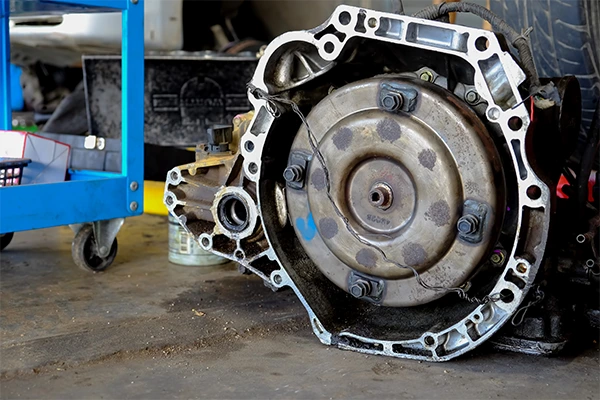What Type of Transmission Fluid Do I Need?
Our transmissions rely on a specialized oil, called transmission fluid, to lubricate the various components inside the gearbox, provide hydraulic pressure, and keep the whole assembly at a safe operating temperature.
Like any automotive fluid, transmission fluid will eventually need replacement. However, that may leave you wondering what exact fluid your vehicle needs. Transmission fluid comes in various types, each with specific chemical properties that correspond to the needs of the particular transmission. Here’s what you need to know about fluid, and how to know which type of fluid your vehicle requires!
Why Does Transmission Fluid Need to be Replaced?
Transmission fluid is designed to run as long as possible and keep your transmission operating smoothly, however, the fluid will gradually break down due to the high temperatures, collecting contaminants that can reduce the lubricating and anti-corrosive properties of the fluid.
As this fluid degrades, the increased friction can cause the transmission to encounter internal issues and overheating. While these issues may start small with hard shifts and lurching acceleration, inadequate transmission fluid can quickly cause irreparable damage to the gearbox and surrounding components. This is why consistent fluid changes are so important to the health of your drivetrain.

Types of Transmission Fluids
Manual Transmission Fluid/Gear Oil
Many older vehicles with manual transmissions will require their manual-specific fluid to operate properly. Manual transmission fluid, or gear oil, is much thicker and has higher friction properties necessary for the quick engagement of gears. These differences in both viscosity and friction characteristics mean that manual transmission fluid will not work in automatic transmissions.
Modern vehicles with manual transmission often require ATF rather than traditional manual transmission fluid, as newer manuals tend to be designed with this fluid in mind. It’s always a good idea to check your manufacturer’s recommendation to ensure you’re using the proper type of fluid when a change is needed.
Automatic Transmission Fluid (ATF)
ATF comes in various formulations, each with distinctive chemical properties that make them suited for certain vehicles over others. Although all are quite similar and serve the same purpose, the differences in viscosities, friction properties, and additives mean that each one is suited to a specific set of vehicles.
The big three American manufacturers are responsible for developing the ATF formulations used on a large portion of vehicles: Dexron (GM), Mercon (Ford), and ATF+4 (Chrysler/Stellantis). Each of these sets a certain standard for fluids to meet in order to be usable in certain vehicles, and in some cases, a certain ATF might meet the criteria for more than just one of these standards. This is why you may see a single fluid being advertised as both Dexron III and Mercon.
However, this overlap does not mean that all are interchangeable. You should always follow your manufacturer’s recommendation for ATF, which can usually be found in your owner’s manual or through the manufacturer’s website. Running ATF with the incorrect viscosity or additives can lead to rapid wear within the gearbox, shearing of the fluid, or other conditions that may damage your transmission.
While these standards are used by a variety of manufacturers, some others require a proprietary ATF to be used in certain vehicles, such as Honda’s DW-1 fluid.
These ATFs are also often seen used in modern manual transmission vehicles, as automakers have moved away from the traditional gear oil lubrication within manuals.

CVT Fluid
Continuously variable transmissions, or CVTs, are a relatively new player in the transmission market. Offering virtually infinite variable gear ratios, CVTs operate quite differently than their traditional automatic or manual counterparts and subsequently require a special fluid designed for their unique components.
CVT fluid has high-friction properties, which allow for the belt to stay put on its pulley. This difference is the primary one between CVT fluid and ATF, and mistakenly using CVT fluid within an automatic transmission can quickly cause major damage due to the increased friction and high viscosity.
Transmission Services in Austin, Texas
If you’re in need of a transmission fluid change, or experiencing issues otherwise, trust the friendly and knowledgeable team at Edgestone Automotive in Austin for all of your transmission needs! Our technicians have extensive experience servicing the gearboxes of various makes and models, and have the expertise and equipment to return yours to full operation!
